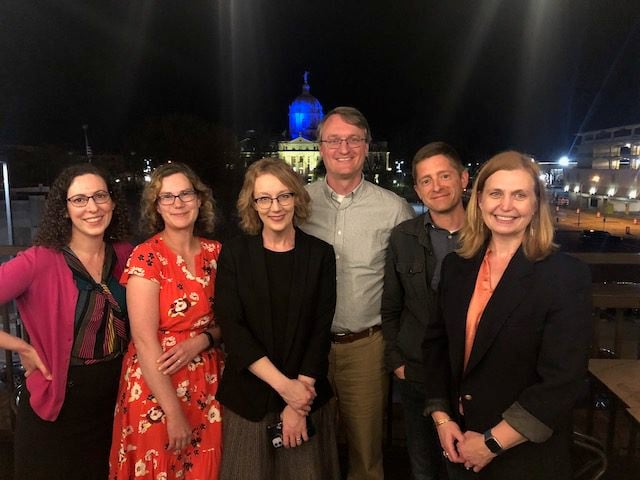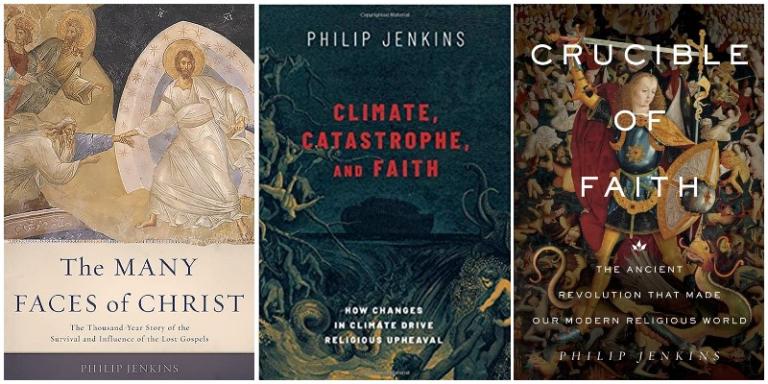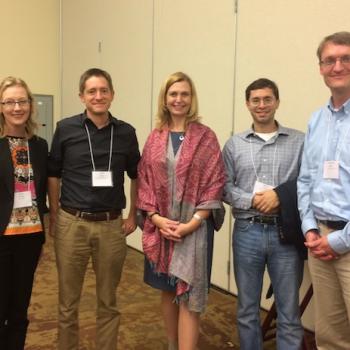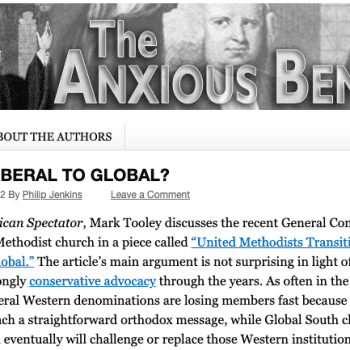As we celebrate our 10th anniversary this month, I’ve asked current and former Anxious Bench contributors to help me tell the blog’s story in our own words. We started with AB’s origins in 2012, then last week surveyed the changes in personnel and topical focus that started around 2015-2016. As we conclude the series this week, I just asked contributors to share some highlights and reflections on their time at The Anxious Bench.
What have you learned about writing for “the public” as a result of blogging here?
Beth Allison Barr (contributor from 2015-present): I have learned so much writing on AB! It was where I found my voice for The Making of Biblical Womanhood. I honestly think academic writing would be much better and more accessible to the public if we learned to turn our research into 1200 word op-eds.
David Swartz (2013-present): Upon joining, I was amazed at how it connected me to people who wouldn’t normally engage my scholarship. I began talking to my own students, family, high school friends, and others who don’t get around to actually reading a 250-page book. And I discovered that some of my more-read posts, some of which only took an hour or two to write, got read twice as much as my book, which took years and years to write!
Philip Jenkins (2012-present): One useful lesson I got from all this was how to relate blogs to books. Next Christendom actually began as a column in Chronicles, as did my book on clergy abuse. No fewer than three of my books over the past decade began as lengthy series of Anxious Bench posts: Many Faces of Christ, Crucible of Faith, and Climate, Catastrophe, and Faith. My recent series of posts on empires will pretty assuredly end up as another book. Waste not, want not.
Andrea L. Turpin (2019-present): Since joining AB, I’ve found it increasingly freeing to write for “the public” in this forum. My formal scholarship is for a broad academic audience, including but certainly not limited to specifically Christian historians. At The Anxious Bench, by contrast, I generally write for the church, broadly defined.
PJ: The other great point about blogs is reading the responses, which in many cases give you an excellent idea of whether you are hitting any nerves.
Miles Mullin (2013-2015): It also provided the opportunity to get feedback from an educated-but-not-professional-historians group of readers. Too many of us forget that our work as historians —perhaps especially Christian historians — needs to have value at some level for the larger culture and church, not just the guild. Writing for The Anxious Bench provided the discipline to intentionally think along those lines.
John Turner (2012-2021): I find that whether it’s books or blogs, it’s not necessarily easy to know what one’s audience or goal is. What’s the measure of success? Number of views? Engagement? I’m sure there are several ways to accomplish such goals, writing incendiary pieces or – more appropriately, I think – developing a following on several platforms.
MM: As with all of us, some of my posts saw quite a bit of engagement, others not much at all. Often, the ones I felt were my best were ignored while others I hurriedly put together to meet my deadline received a lot of attention. One of the lessons that that reaffirmed in my own heart was that we should not ultimately evaluate our work or worth based on its reception. That is an important lesson for anyone to learn, but it seems especially appropriate for Christians.
JT: I think the single thing that readers liked most was a comment in my Anxious Bench bio that “if you want to follow him, you’ll have to do it in person.” I eventually broke down and created a Twitter account.
Daniel K. Williams (2020-present): Because of the comments I have received in response to my posts, I have also realized that readers for The Anxious Bench come from a wide variety of political and religious perspectives. I suspect that many of The Anxious Bench‘s core readers — perhaps 200 or so — may be Christian academics who appreciate AB’s efforts to wrestle with contemporary and historical questions in a way that combines a commitment to good historical research with Christian faith commitments and a sensitivity to racial justice and gender equity. But because The Anxious Bench also runs on Patheos, it attracts a wider range of evangelical readers who are more politically conservative and sometimes outraged that professing Christians hold certain views that they consider too liberal. And, for whatever reason, The Anxious Bench also attracts a number of readers who are angry about Christianity or American churches in general and are eager to express that anger in their public comments. So I’m mindful that anything that I write on contentious topics such as race, politics, and abortion is going to reach a variety of readers who don’t necessarily share all of my views. That awareness has helped me think more carefully about how my statements may come across to others with differing perspectives — which I think has been very useful for me. I’m always eager to learn from the perspectives shared in public comments on my blog pieces, even if the comments are critical.
Nadya Williams (2021-present): One thing I have learned from blogging at AB is how kind “the public” is. People are willing to read and consider ideas that might be in progress, and this has been so humbling and helpful for me in thinking through complex questions, such as what is the value of military history for evangelicals?
Out of all the posts you’ve written for The Anxious Bench, do you have a personal favorite?
PJ: Let me answer in what may be a surprising way. Of my own pieces, I would choose a couple I did on really ancient history, on Stonehenge, and Bronze Age Europe. Why those? Because if I want to publish in lots of areas, such as medieval history, I can find academic outlets easily enough. But those ancient things are matters I am deeply interested in, and this is a great informal platform for me, where I can explore the ideas as I wish, although I don’t have the credentials.
BAB: I loved my Halloween post that ended up in WaPO. I wrote it at 2am after I had seen a poll about how evangelical Christians were still suspicious about Halloween. That post really helped me find my writing voice. My second favorite is the tribute I wrote to my grandfather after his death in 2017 that also highlights the importance of oral history projects. (One day I plan to write about my grandmothers.) My third favorite is the post that Chris asked me to write when Notre Dame caught fire. I also wrote it across the span of a few hours one night and it ended up as a Religion News story.
Agnes Howard (2012-present): Much as I love sneaking Puritans into relevance with most topics, I think a favorite of my own is a piece I wrote about naturism (that is, nudists).
DS: I’ve found The Anxious Bench to be a wonderful way to fuse my profession, faith, personal life, and scholarship. In fact, my most popular — and personally rewarding — posts have combined many of these categories. I think especially of “The 2020 Census, Immigration, and the Future of American Evangelicalism,” in which I describe my encounter with immigrant churches in Boston, “The Amish Farmer and the Pietist Prince,” in which I describe my encounters at ancestral sites in Europe, and “Falwell vs. Claiborne: A Report from Lynchburg,” in which I describe my encounters in April 2018 with right-wing evangelicals at Liberty University and rival left-wing evangelicals at a “Red Letter Revival.”
Tal Howard (2012-present): I hope I have added some non-American dimensions and some emphasis on the history of Catholicism. “Two Popes Walked into a Bar” comes to mind.
DKW: Perhaps my personal favorite of the pieces that I’ve written is “Roe v. Wade‘s Imminent Demise Reflects Liberal Protestantism’s Decline.” The theory that I explored in this piece about Roe v. Wade‘s connection to liberal Protestantism has become the basis for a book proposal on a religious history of Roe v. Wade, so this is an example of a piece of popular writing inspiring further research and scholarship for me.
ALT: I have three (*sheepish grin*) favorites from among my posts: two on developing a healthier theology of gender that accounts for real differences between women and men but doesn’t put people in complementarian boxes; and one trying to bring some sanity to evangelicals’ use of the terms and concepts “woke” and “CRT.” I think it’s noteworthy that in two of these posts, my thoughts are grounded in book reviews: I think better in conversation with others.
DS: I’ve also found it really rewarding to feature, through book reviews and author interviews, the work of others who don’t have a platform like the Anxious Bench.
Chris Gehrz (2016-present): I love it when I can convince contributors here to collaborate, as when we shared some favorite travel destinations — or when Beth, Kristin, and I paid tribute to Rachel Held Evans. But my favorite blogging comes at the intersection of my roles as historian and parent. For example, my daughter reading American Girl books prompted me to research their back stories. Of course, then Melissa Borja came along and wrote a much more interesting American Girl post.

Do you have any favorites from other contributors?
JT: Philip Jenkins’s post on the missing ending to Mark’s gospel. Every Easter, I sit in my church and hear about how Jesus first appeared to the women. Like many people, I like the idea. But then Philip reminds us that Paul asserts that the risen Christ first appeared to Cephas (Peter), and he suggests that the appearance was on a lakeshore in Galilee. It’s classic Jenkins – a careful reading of biblical texts and an ability to think creatively and clearly. I love this post (and a few follow-ups) so much that I think about it every Easter.
DKW: My favorites from other AB contributors include Andrea Turpin’s “Two Questions for Complementarians (and One for Egalitarians),” which I found very thoughtful and balanced. I’ve recommended it to several others. I also liked David Swartz’s series on evangelical immigration — just as I’ve appreciated many of his pieces, which I think are very well researched.
NW: I loved Dan’s piece about “Race and Liberalism in Dr. Seuss.” (We have a 6 year-old and a 3 year-old, so Dr. Seuss is an important figure in our home.) Also, I recently ran across a piece by John Fea from the early days of the Bench, “Sin and the Historian,” and found it very helpful. Finally, I really appreciated Chris Gehrz’s piece earlier this year, “Is Christian History Faithful, Hopeful, and Loving?”
AH: I love Chris’s columns about sports.
JT: Also, Kristin Du Mez’s post on the ‘gatekeepers’ of historical study about American evangelicalism. Her thoughtful critique forced me to think about the limits of my own ability and attempts to make sense of evangelicalism over the years.
DS: Favorite posts from my Anxious Bench colleagues often involve “the story behind the history,” that is, the process of how their ideas are generated, research and writing get done, and books are marketed.
For all the change, in what ways do you see continuity between the blog that started in 2012 and the one still being published in 2022?
AH: Many ways — good writing, good history, and much continuity represented not least by the faithful, indefatigable entries of Philip Jenkins.
PJ: Well, we still find the roots in evangelical-oriented colleges. I also like to think we are all using our broadly historical training to address important issues of interest to believers, broadly defined. It is also impressive to see how many of us have gone on to publish major books, commonly drawing on material we first presented at Anxious Bench.
JT: The Anxious Bench isn’t an ideological blog. People write about all sorts of things from a variety of Christian perspectives. The quality of the posts has only gotten better over the years (probably helped by my departure). I am amazed when I read so many long, substantive, thoughtful posts. Whether it’s CRT or abortion or the early church, I know when I look at The Anxious Bench that I’m going to read posts that enrich my mind and stir my soul.
DKW: It is still a space where Christians who are working as historians can communicate their research and ideas to the public and apply their insights to important issues in both the past and the present.
BAB: Our tagline has always been the Relevance of Religious History for Today, and that is still what we continue to do: connect the past with the present and show our readers why history matters.














